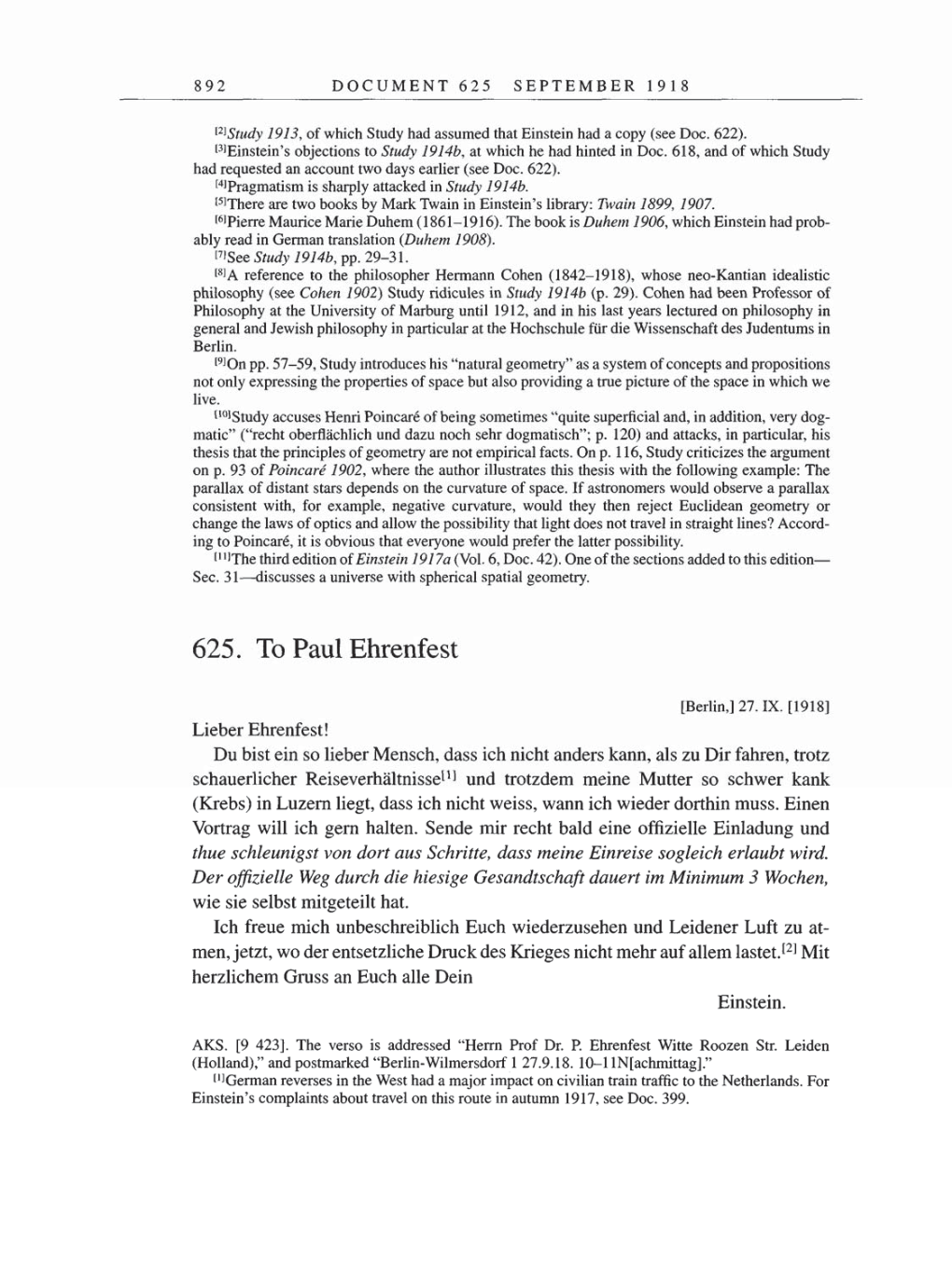892
DOCUMENT
625 SEPTEMBER 1918
[2]Study
1913,
of
which
Study
had assumed that Einstein had
a copy
(see
Doc.
622).
[3]Einstein’s
objections
to
Study
1914b, at
which he had hinted in Doc.
618,
and
of
which
Study
had
requested an
account two
days
earlier
(see
Doc.
622).
[4]Pragmatism
is
sharply
attacked in
Study
1914b.
[5]There
are
two
books
by
Mark Twain in Einstein’s
library:
Twain
1899,
1907.
[6]Pierre
Maurice Marie Duhem
(1861-1916).
The book is Duhem
1906,
which Einstein had
prob-
ably
read in German translation
(Duhem
1908).
[7]See Study 1914b, pp.
29-31.
[8]A
reference
to
the
philosopher
Hermann Cohen
(1842-1918),
whose neo-Kantian idealistic
philosophy
(see
Cohen
1902) Study
ridicules in
Study
1914b
(p. 29).
Cohen had
been Professor of
Philosophy
at the
University
of
Marburg
until
1912,
and in his
last
years
lectured
on philosophy
in
general
and Jewish
philosophy
in
particular at
the Hochschule für die Wissenschaft des Judentums in
Berlin.
[9]On pp.
57-59,
Study
introduces his "natural
geometry"
as a
system
of
concepts
and
propositions
not
only expressing
the
properties
of
space
but also
providing a
true
picture
of
the
space
in which
we
live.
[10]Study accuses
Henri Poincaré
of
being
sometimes
"quite superficial and,
in
addition, very
dog-
matic" ("recht oberflächlich und dazu noch sehr
dogmatisch"; p.
120)
and
attacks,
in
particular,
his
thesis that the
principles
of
geometry are
not
empirical
facts. On
p.
116,
Study
criticizes the
argument
on p.
93
of Poincaré
1902,
where the
author
illustrates this thesis with the
following example:
The
parallax
of
distant stars
depends on
the curvature
of
space.
If
astronomers would observe
a parallax
consistent
with,
for
example, negative
curvature,
would
they
then
reject
Euclidean
geometry or
change
the laws
of
optics
and allow the
possibility
that
light
does
not
travel in
straight
lines? Accord-
ing
to
Poincaré,
it is obvious that
everyone
would
prefer
the latter
possibility.
[11]The
third edition
of
Einstein 1917a
(Vol.
6,
Doc.
42).
One
of
the
sections
added
to this
edition-
Sec.
31-discusses
a
universe with
spherical spatial geometry.
625.
To
Paul
Ehrenfest
[Berlin,]
27. IX.
[1918]
Lieber
Ehrenfest!
Du bist ein
so
lieber
Mensch,
dass ich nicht anders
kann,
als
zu
Dir
fahren, trotz
schauerlicher Reiseverhältnisse[1] und trotzdem meine
Mutter
so
schwer
kank
(Krebs)
in
Luzern
liegt,
dass ich
nicht
weiss,
wann
ich
wieder
dorthin
muss.
Einen
Vortrag
will ich
gern
halten.
Sende
mir
recht
bald eine offizielle
Einladung
und
thue
schleunigst
von
dort
aus
Schritte,
dass
meine Einreise
sogleich
erlaubt
wird.
Der
offizielle
Weg
durch die
hiesige
Gesandtschaft
dauert
im Minimum
3
Wochen,
wie sie
selbst
mitgeteilt
hat.
Ich
freue mich
unbeschreiblich Euch wiederzusehen und
Leidener Luft
zu
at-
men,
jetzt, wo
der entsetzliche
Druck
des
Krieges
nicht mehr
auf
allem
lastet.[2]
Mit
herzlichem
Gruss
an
Euch alle Dein
Einstein.
AKS.
[9 423].
The
verso
is addressed "Herrn
Prof
Dr.
P.
Ehrenfest Witte Roozen Str. Leiden
(Holland),"
and
postmarked
"Berlin-Wilmersdorf
1
27.9.18. 10-11N[achmittag]."
[1]German
reverses
in the West had
a
major
impact on
civilian train traffic
to
the Netherlands. For
Einstein’s
complaints
about travel
on
this
route
in
autumn 1917,
see
Doc. 399.
